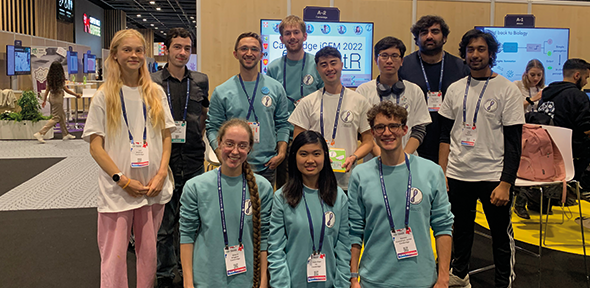
Submitted by Susana on Thu, 12/01/2023 - 09:59
The team of undergraduate students and postgraduate instructors, including a group of PhD candidates from the Cambridge BBSRC and SBS DTP, worked on a synthetic biology project to represent Cambridge in the International Genetically Engineered Machine (iGEM) 2022 competition.
iGEM is the largest synthetic biology competition and community worldwide, tantamount to the synthetic biology world championships, where student teams from hundreds of universities across the globe set out to design and implement projects to solve real-world issues using synthetic biology. The competition runs annually, culminating in the ‘Grand Jamboree’ in the Autumn, where teams come together to present their work and compete for awards. The 2022 iGEM Jamboree was held in Paris, where the Cambridge team were awarded one of the iGEM Gold Medals and were nominated for the highly competitive ‘Best New Basic Part’ special prize.
For the first time, this year the Cambridge team was entirely student-run, led by the Cambridge University Synthetic Biology Society Committee, which included DTP students Camillo Moschner (Department of Engineering), Chris Micklem (Department of Physics and The Sainsbury Laboratory), Georgeos Hardo (Department of Engineering) and Kavi Shah (Department of Genetics), who raised the funding necessary to relaunch iGEM as an opportunity for Cambridge students again; the first time in 6 years. They subsequently organised, trained and then supervised the team as they worked in the BioMakespace community biolab over the summer.
This year, the Cambridge team presented “AdaptR”, a project in the ‘Foundational Advances’ track of iGEM, aimed at tackling the fundamental issue of robustness currently limiting the efficacy of many synthetic biological circuits. To this end, the team designed a biological integral controller, featuring an innovative antithetic motif and conducted extensive modelling to demonstrate its ability to robustly adapt to perturbations. They then used advanced modular cloning and automation methods to design, build and characterise an array of genetic ‘parts’ for use in synthetic biological antithetic integral controllers. As a foundational advance, the team’s work contributes towards the base upon which next-generation, robust genetic circuits might be built, to help synthetic biology realise its full potential.
Speaking on the experience, Camillo Moschner said, “This has been a truly incredible experience. The team was fantastic, with lots of ideas and creativity. We were very happy to be awarded a Gold Medal, and also to be nominated for the ‘Best New Basic Part’ prize, meaning that one of our new genetic parts was rated as one of the 5 most useful contributions from almost 400 teams from around the world that participated in 2022!”
Chris Micklem added, “We are immensely proud of what has been accomplished; the fact that a small, student-run team with such limited resources was able to attain these heights is remarkable and is a testament to the ambition and drive of Cambridge students. This, of course, would not have been possible without the tireless efforts of the whole undergraduate and instructor teams. Moreover, we are also incredibly grateful for the generous financial support received from the School of Biological Sciences, C2D3 Computational Biology, the Department of Engineering and several of our Colleges, as well as local biotech start-ups Evonetix, bit.bio and Colorifix. The Cambridge University Synthetic Biology Society is currently organising for Cambridge iGEM 2023 – if you are interested in getting involved with or supporting this fantastic opportunity at Cambridge, please do get in touch!”
To learn more about the 2022 Cambridge iGEM team and their project, “AdaptR”, check out their wiki.
If you are interested in joining the 2023 Cambridge iGEM team, or would like to support their activities, you are encouraged to connect with the Cambridge University Synthetic Biology Society and to get in touch directly: cusynbiosoc@gmail.com

